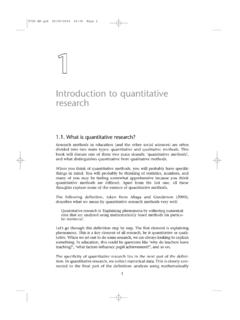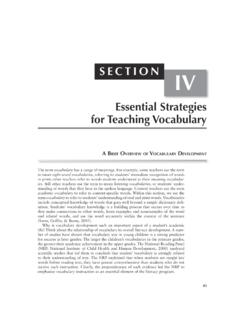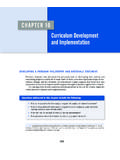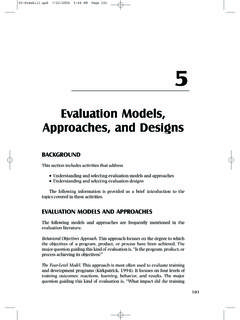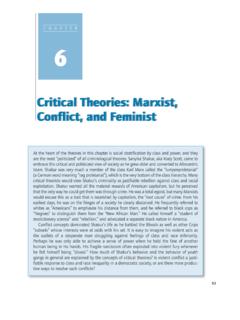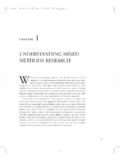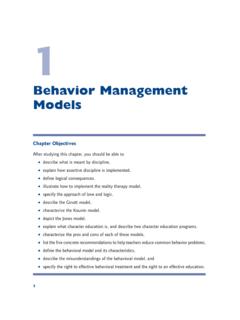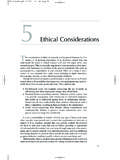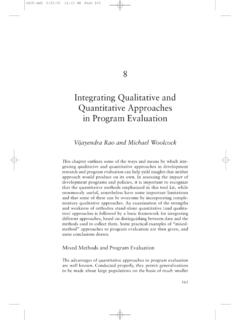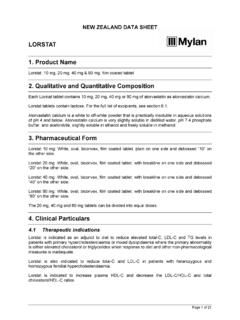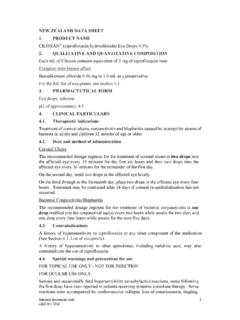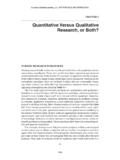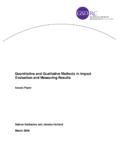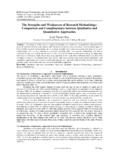Transcription of CHAPTER 2 RESEARCH PHILOSOPHY AND …
1 13 2 RESEARCH PHILOSOPHY AND qualitative INTERVIEWSIN THIS CHAPTER :CHOOSING A PHILOSOPHY OF RESEARCHDIFFERENCES BETWEEN POSITIVIST AND NATURALIST CONSTRUCTIONIST PARADIGMSAN ILLUSTRATION OF THE DIFFERENCES IN PRACTICEVARIATIONS ON THE CORE PARADIGMP ositivism Yields to PostpositivismNaturalist and Interpretive Constructionist PerspectivesCritical, Feminist, and Postmodern PerspectivesTOWARD THE RESPONSIVE INTERVIEWING MODELCHAPTERQUALITATIVE INTERVIEWING14In addition, the choice of techniques also depends on your willingness to accept the assumptions underlying each set of tools. Researchers who use quantitative tools, techniques that empha-size measuring and counting, are called posi-tivists; those who prefer the qualitative tools of observation, questioning, and description are called naturalists.
2 Positivists and naturalists dif-fer in their assumptions about what is important to study, what can be known, what RESEARCH tools and designs are appropriate, and what standards should be used to judge the quality of the RESEARCH . Taken together, these assump-tions are termed RESEARCH paradigms or RESEARCH assume that reality is fixed, directly measurable, and knowable and that there is just one truth, one external reality. In contrast, naturalistic researchers assume that reality constantly changes and can be known only indirectly, through the interpretations of people; they accept the possibility that there are multiple versions of reality.
3 People who are uncomfortable with such uncertainty are more likely to choose the quantitative paradigm with its assumptions of a single, measurable (countable) and knowable truth; people who can tolerate uncertainty are more likely to favor a qualitative paradigm with its acceptance of multiple perspectives of truth and constantly changing that long ago, many quantitative researchers looked down on any project that did not involve precise measurement; they rejected observational RESEARCH and open-ended inter-viewing as unscientific. qualitative researchers were equally critical of positivists work, arguing that the positivists search for generalizable rules and their focus on quantification ignored mat-ters that are important but not easily counted and denied the complexity and the conditional nature of , the conflict has calmed down in recent years.
4 There is widespread recogni-tion that people can do good work using either paradigm as long as they adhere to its underly-ing assumptions. To help you understand the assumptions behind qualitative interviews, in this CHAPTER we compare the assumptions of the positivist and naturalistic A PHILOSOPHY OF RESEARCHWhy do you need to understand differences in philosophies of RESEARCH ? Why not just go ahead and do a survey or carry out the interviews? You can, of course; but for several reasons (listed below), it is better first to understand the assump-tions behind the RESEARCH tools you data-gathering tools you use depends largely on the RESEARCH question at hand.
5 You do not use interviewing to analyze census data; you don t count to get descriptions of what happened in a closed-door meeting. In practice, researchers choose topics that lend themselves to quantitative or qualitative techniques based on their interests, personalities, and talents. If you enjoy talking with people and shudder just thinking about endless streams of numbers, you are more likely to choose a project suitable for in-depth interviewing than one requiring reams of statistical 2 RESEARCH PHILOSOPHY AND qualitative INTERVIEWS15 1. The assumptions provide guidance for conducting your RESEARCH . They prescribe your RESEARCH role whether you should try to be neutral or let your own personality come through.
6 They indicate whether you must ask each person in a study the same questions in an identical way or can change ques-tions midstream. 2. Dissertation committee members, institutional review board members, and journal reviewers and editors might follow different RESEARCH philosophies from yours and may be unwilling to accept the legitimacy of your approach unless you can make its assumptions clear. 3. You have to comply with the RESEARCH standards specifi c to the RESEARCH paradigm you are using rather than those that guide alternative approaches. qualitative interviewers need not apologize for not interviewing hundreds of people any more than quantitative researchers need to apologize for not producing in-depth descriptions.
7 4. Understanding the theoretical assumptions helps you recognize what the techniques you are working with do well and what they do less well, and lets you design your RESEARCH to take full advantage of their strengths and compensate for their summarize: First, the assumptions of the RESEARCH paradigm guide how you do your work; second, they enable you to explain the methods you are using to your professors, to editors or reviewers, and to members of the institutional review board; third, each RESEARCH paradigm comes with its own standards for evaluating the quality of RESEARCH ; and finally, fully understanding the assumptions that undergird the techniques you use gives you confidence to build on the strengths and offset the weaknesses of those BETWEEN POSITIVIST AND NATURALIST CONSTRUCTIONIST PARADIGMSR esearch philosophies differ on the goals of the RESEARCH and the way to achieve these goals.
8 Is the purpose to test theories and discover general principles, or is it to describe and explain com-plex situations? Should the work be primarily deductive; that is, should it start out with broad theories and suppositions and then systematically test their implications? Or should it be inductive; that is, should it build explanations from the ground up, based on what is discovered? Is there one truth out there that the researcher is trying to measure, or are there many possibly contradic-tory ones?Positivists claim there is a single, objective real-ity that can be observed and measured without bias using standardized instruments. Naturalists and, in particular, interpretive constructionists, accept that there is a reality but argue that it cannot be measured directly, only perceived by people, each of whom views it through the lens of his or her prior experience, knowledge, and expectations.
9 That lens affects what people see and how they interpret what they find. What we know, then, is not objective; it is always filtered through people, always the positivists, the goal is a universal truth, a rule or explanation that is always true so long as specified conditions hold. For the naturalists, qualitative INTERVIEWING16what is discovered is embedded in a complex and changing reality from which it cannot be rea-sonably abstracted. Naturalists seek to explain what they have seen, regardless of whether their findings can be extended beyond the time and circumstances of the current study. Naturalistic RESEARCH is focused more on understanding what has happened in a specific circumstance than on trying to predict what will happen the positivist paradigm, the researcher sees himself or herself as a neutral recorder.
10 Different researchers using the same instruments should reach the same conclusions. Positivists evaluate the success of their RESEARCH in part by measuring how closely the findings of different researchers match. Though recognizing that no data col-lection instrument is perfect, positivists seek to develop standardized instruments that they believe precisely tap a single reality. They seek to imitate the sciences that have developed quan-titative ways of measuring physical, biological, or chemical phenomena in replicable ways. In addition, positivists judge RESEARCH in terms of its validity that is, the extent to which their RESEARCH tools actually do measure the underly-ing concept that they are supposed to who emphasize that all mean-ing is sifted through people s prior experience and biases are called constructionists because they believe that people build or construct their understanding of the external world that is, they interpret it.
